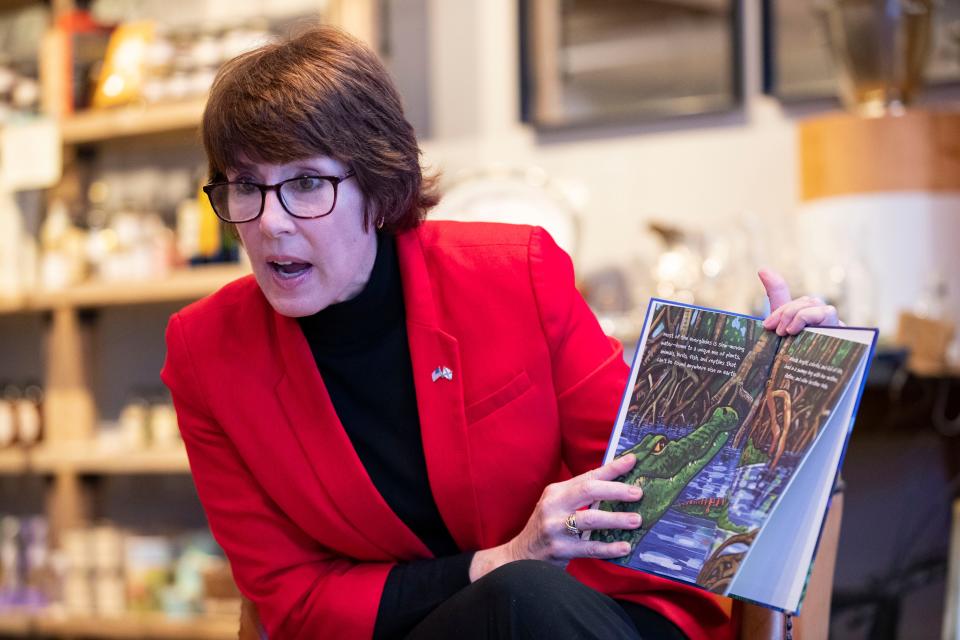Florida House election bill sparks debate over drop boxes, 2026 gubernatorial runoffs
- Oops!Something went wrong.Please try again later.
- Oops!Something went wrong.Please try again later.
The Florida House of Representatives rolled out a major elections bill Monday night that reduces the number of mail-in ballot drop-off boxes for the 2024 election and revives the runoff primary in 2026, when Florida will elect a new governor.
As written, the proposal (PBC SAC 24-06) from the State Affairs Committee limits drop-off boxes to the county supervisor’s main office, branch offices, and early-voting sites. The limitation prohibits boxes at city halls, civic centers, county courthouses, fairgrounds if they are not an early voting site.
“That’s going to affect a lot of voters. It’s going to limit the ability (to vote) in Pinellas, Sarasota, Broward,” said Brad Ashwell of All Voting is Local, a non-partisan voting rights advocacy group. Tuesday morning, Ashwell said he hadn’t had time to fully digest the impact of the 44-page committee bill, which will be heard in committee Wednesday.
But he did conclude that one line in the bill that limits drop-off box locations will have a significant impact on voter participation: "There are counties that are going to see a dramatic reduction" in drop boxes, Ashwell said.
The bill's main focus is to revive Florida's runoff election and set requirements and schedules for a three-election cycle of a first primary, a second (or runoff) primary and a general election.
The Legislature temporarily eliminated runoff primaries in the wake of the 2000 election debacle with a bill that reinstated the second primary in 2004 if the Legislature failed to readdress the issue. Lawmakers formally eliminated runoffs starting with the 2006 election, citing costs.
The new proposal designates the first primary as an “elimination” election. If no candidate wins a majority of the votes, a second primary between the top two finishers is held as a “nomination election.”
The proposed change in drop-off box locations comes as the nation’s third largest state prepares for a November election that likely will feature a rematch between President Joe Biden and former President Donald Trump. Also on the November ballot is Republican U.S. Sen. Rick Scott, whose reelection bid will help determine which party controls the Senate.
The bill also sets rules for how the parties will nominate candidates to be Florida’s governor when Gov. Ron DeSantis’ term ends in January 2027, after two terms in which he emerged as one of the nation’s leading cultural war warriors, spearheading initiatives on how sex and history are taught, and limiting access to voting and abortion.
The 2026 GOP primary could be a crowded field: Three current cabinet members, at least two members of Congress, and other former officials appear to be maneuvering for the nomination to succeed DeSantis.

The bill immediately sparked comments from Republicans and Democrats in Washington, who also happen to be scions of two leading political families.
Former Tallahassee U.S. Rep. Gwen Graham lost the 2018 Democratic gubernatorial nomination 34%-31% to former Tallahassee Mayor Andrew Gillum.
When no primary candidate gets more than 50% of the vote, runoffs allow for the strongest candidate in the general election. My Dad would not have been Governor without the runoff. Bringing back runoffs would be good for Florida and democracy. https://t.co/H2p2f9I0wO
— Gwen Graham (@GwenGraham) February 20, 2024
She posted on social media that runoffs ensures the strongest candidate makes it to the general election ballot. Graham had split the moderate Democratic vote with former Miami Beach Mayor Phil Levine, enabling Gillum, then under FBI investigation for alleged City Hall corruption, to win with a plurality of the vote. He later was acquitted in federal court.
Graham notes that without a primary, her father – former Gov. and later-U.S. Sen. Bob Graham – would never have become governor. The younger Graham is currently an assistant secretary of education in the Biden administration.
Meantime, U.S. Rep. Matt Gaetz, the subject of a so-far whispered gubernatorial campaign by his Tallahassee supporters, immediately criticized the bill for promoting runoffs, which he said are expensive and “empower establishment candidates over firebrands.” He also said he had no interest in the Governor's Mansion.
1. Runoff elections cost taxpayers millions, increase targets for fraudsters and empower establishment candidates over firebrands. They are a bad idea.
2. You guys in Tallahassee didn’t have to do this. I have no plans to run for Governor. https://t.co/rOsoPcGM0r— Matt Gaetz (@mattgaetz) February 19, 2024

Charles Zelden, who teaches history and political science at Nova Southeastern University in Fort Lauderdale, suspects Republican leaders are focused on preventing a “firebrand” from capturing the party’s nomination in 2026, similar to what happened to Graham and the Democrats in 2018.
“They are worried about an insurgency MAGA type. There’s a reason Matt Gaetz isn’t happy with this bill. It makes his job to run for governor harder,” Zelden said.
Zelden added that runoffs attract fewer voters, are self-selective, and not necessarily representative of the whole electorate.
“It comes down to what is it that you want,” when the selection appears to be an establishment candidate or a firebrand, he said.
James Call is a member of the USA TODAY NETWORK-Florida Capital Bureau. He can be reached at jcall@tallahassee.com. Follow him on X: @CallTallahassee
This article originally appeared on Tallahassee Democrat: Florida GOP wants runoff primaries for 2026, fewer drop boxes for 2024

